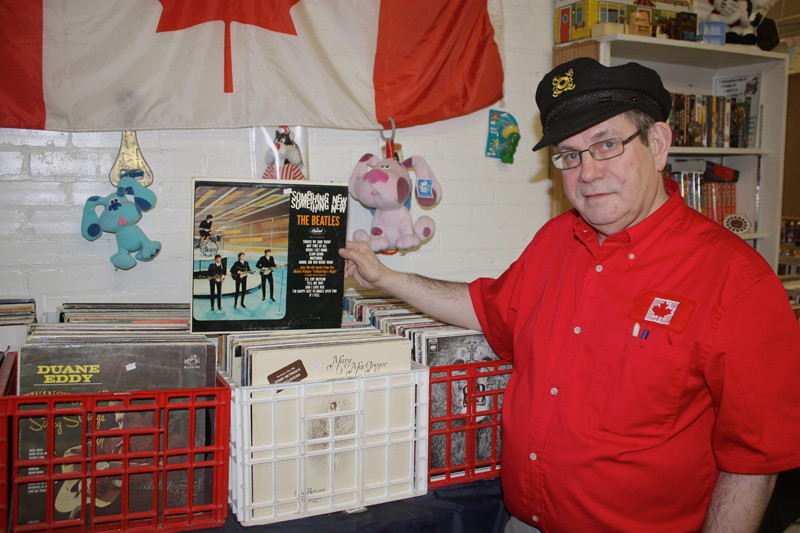Nostalgia for sale
Flea market offers products - and a way to buy them - that come from an older time
It’s a busy Sunday afternoon at Mulvey Market. Dozens of people walk slowly through the aisles between the wood stalls that fill the old warehouse, pausing occasionally to pick up a trinket that catches their eye.
The large room is filled with the sound of chatter between vendors and potential customers. John Fogerty comes through the speakers lazily.
Diane Puttee runs a small book stand right in the middle of the warehouse called Doc Books, which she operates in memory of her late mother, a doctor.
She says that if customers can’t find what they are looking for among her 2,000 to 3,000 book inventory, she will find it.
“What I see is what I’ve got,” Puttee says. “If I don’t have it, I’ll get it.
“I also buy books for people who need large print. That’s what Doc Books is about - I think books are important.”
This willingness to meet individual requests and needs isn’t always good for the bottom line. Puttee will sometimes acquire special books for customers who never return.
“Some days you make money and other days you don’t,” says Puttee, who nonetheless thrives in the face-to-face, negotiable world of the flea market.
“It’s a place where people are regulars. You know them by name and it’s a small world,” she continues. “My customers love me so much they give me hugs.”
The number of those customers has been increasing.
Dave Dixon, who runs the entire market, says that the average number of people coming through on a given day has more than doubled, to between 500 and 750 people, since he started Mulvey Market 10 years ago.
“It used to be an old person type of thing, and now we’re getting younger people who are collecting records that were made before they were born,” says Dixon.
“One of the things that’s increasing interest in the market is people looking back to their youth,” he says. “They buy a doll or a movie or something from when they were young.
“It’s not just old antique clocks and stuff, there’s a lot more to it.”
The nostalgic element is driven largely by the customers themselves in a market where supply so closely depends on demand and trends change over time.
“When I started in the market selling my stuff 20 years ago, it was brass and cut glass. You couldn’t keep it in stock and now you can’t give it away,” Dixon says. “People buy brass to melt it down for scrap.”
Barry Timbury, who at Mulvey goes by Rock n’ Roll Barry, runs a music and toys store at one end of the market. He says that much of the nostalgia that drives his sales is inherited from parents and grandparents.
“They’re buying records like crazy,” he says of the many 13- to 18-year-olds that frequent his stall. “I’ve noticed that especially in the last three or four years.”
“They just want the older stuff and they want vinyl,” Timbury says. “Vinyl is a much clearer and better sound quality, and that is what’s attracting them more than anything else.”
Timbury’s best sellers are Roy Orbison, the Beatles and the Ink Spots. Some of the interest also comes from popular culture’s recycling of old hits.
“There are a lot of newer groups doing a lot of covers of older songs. Especially hip hop and rap artists,” Timbury says.
To give a sense of the number of records, cassettes, toys and other items in his stall, Timbury estimates that his current stock at its listed price would fetch around $50,000.
He estimates that 70 per cent of his sales are to return customers, which means that like Puttee, he is always updating his merchandise. He has to.
“Kids are smart. They know what’s good and what isn’t,” he says.
Dixon says different vendors have different motivations.
“Some people do it as a way to make some extra cash, some people do it for social reasons, some people are retired and they still want to work a day or two. They don’t necessarily need money, but they like to be productive.”
No matter the reason, however, it takes a strong work ethic and a love of people to be successful.
“Mostly what makes a successful vendor is, like most things, the people who work there,” Dixon says. “The people who arrive early and leave late and change their stock around.”
For Timbury, who works five days a week at another job, selling vinyl records to teenagers is a hobby.
“I do it for fun. I do it for the kids. I do it because I like it,” Timbury says. “As long as it still is fun, I’ll keep doing it.”
Visit Manitoba’s largest flea market at 421 Mulvey Ave. East, every Saturday and Sunday from 10 a.m. to 5 p.m.
Published in Volume 66, Number 18 of The Uniter (February 1, 2012)






